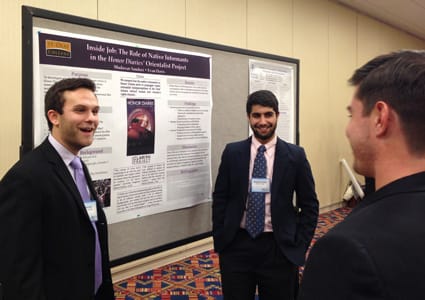Students present research at Middle East Studies Association conference

Two St. Olaf College students presented their research on the role of native informants in the award-winning documentary film Honor Diaries at the Middle East Studies Association Annual Meeting in Washington, D.C.
The students, Evan Davis ’15 and Mudassar Sandozi ’15, worked with Assistant Professor of Sociology Ibtesam Al Atiyat through a Directed Undergraduate Research course to analyze the film’s portrayal of Muslim women.
Their paper, titled Inside Job: The Role of Native Informants in Honor Diaries’ Orientalist Project, was selected along with 16 other papers from universities in the United States, Europe, and the Middle East.
“Documentaries draw their authority because they attract a more sophisticated audience,” says Davis. “There is a tendency to attribute a greater degree of legitimacy to a documentary simply because it gives the semblance of a nuanced perspective. However, what I realized while doing this research is that some documentaries use this authority to obscure their participation in confirming stereotypes, in this case about Islam and Muslim women, and present a political agenda.”
Honor Diaries, which was released in 2013, investigates violence against women in what the film describes as honor-based societies, focusing on female genital mutilation, honor violence and honor killings, early and forced marriage, and lack of access to education. The film features in-depth interviews with women’s rights activists, some of whom are “native informants” from within the countries being discussed.
But Davis and Sandozi argued that these informants could not be counted on to give a representative portrayal of their societies. Drawing on the works of Edward Said, Theodor Adorno, Michel Foucault, Chandra Talpade Mohanty, Gayatri Spivak, Leila Ahmed, and Marnia Lazreg, the two St. Olaf students analyzed the role these informants played in the film and concluded that they only serve to propagate classic orientalist misperceptions of Islam, hidden behind the rhetoric of human and women’s rights.
“Their research has shown that, although several ‘native’ women spoke in the film about their lives and activism, this should not translate automatically into an authentic and representative depiction of the lives of a group as diverse as Muslim women,” says Al Atiyat.
The international conference was held this year in Washington, D.C. Sponsored by the Middle East Studies Association, the meeting showcased sessions relating to the conflicts in the spotlight of global media outlets, such as issues related to Palestine or the current U.S. policy toward ISIS.
“Spending the weekend at the conference in D.C. definitely gave me perspective as to how our individual effort fit into a much wider body of research being developed by brilliant minds globally,” says Sandozi. “As a result of this research, I’ve become a much more conscientious consumer of media analyses of current events.”
Al Atiyat says Davis and Sandozi were highly commended at the conference for being two young men doing feminist research — and, she notes, Sandozi is not even a social science student.
“This is the beauty of liberal arts education,” Al Atiyat says. “One has the chance of transcending disciplines and gaining a critical perspective to knowledge.”